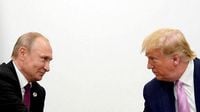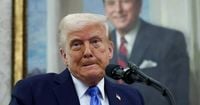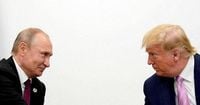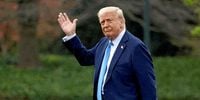In a strikingly aggressive stance, U.S. President Donald Trump expressed his "furious" discontent with Russian President Vladimir Putin during an interview with NBC News on March 30, 2025. The president's comments came as a response to Putin's recent remarks regarding the future of Ukrainian President Volodymyr Zelensky, which Trump interpreted as an obstruction to peace efforts in Ukraine.
Trump made it clear that if an agreement to end the ongoing conflict in Ukraine is not reached, he would impose substantial tariffs on Russian oil. "If Russia and I cannot come to an agreement to end the bloodshed in Ukraine, and I think it’s Russia’s fault, I will impose secondary duties on all oil coming out of Russia," he warned. These tariffs could range from 25% to 50% and could be enacted "at any moment," depending on the situation.
During the interview, Trump emphasized the urgency of the matter, stating, "If you buy oil from Russia, you will not be able to do business in the United States." This marks a significant shift in his administration's approach to Russia, as Trump seeks to leverage economic pressure to facilitate a resolution to the conflict.
Trump's anger was particularly provoked by Putin's suggestion of a "transitional administration" for Ukraine, which would imply the removal of Zelensky from power. Zelensky has vehemently rejected these proposals, accusing Putin of stalling negotiations and perpetuating the conflict. The Ukrainian president noted that such suggestions only serve to delay any potential peace talks.
Amidst this diplomatic tension, Trump also indicated his intention to speak with Putin in the coming days, hoping to mend relations and push for a ceasefire. He stated, "I have a very good relationship with him, and the anger will dissipate quickly if he does what he needs to do." This reflects Trump's ongoing efforts to balance a tough stance with a willingness to negotiate.
In addition to his comments on Russia, Trump issued a stark warning regarding Iran. He stated that if Tehran fails to sign a nuclear agreement, "there will be bombings." This declaration underscores the heightened tensions between the U.S. and Iran, especially since the two nations have not had formal diplomatic relations since 1980, communicating only through intermediaries.
Trump's remarks about Iran were accompanied by the suggestion of potential tariffs on Iranian goods as part of his broader strategy to exert maximum pressure on the Iranian regime. He has previously criticized the 2015 nuclear deal and has expressed a desire to renegotiate terms that would limit Iran's nuclear capabilities.
Moreover, during the NBC interview, Trump hinted at the possibility of running for a third presidential term, despite the constitutional restrictions that prohibit more than two terms. "I’m not joking when I say that many people want me to do this," he asserted. This statement has raised eyebrows, as it challenges the established norms of U.S. political tradition.
When asked about a scenario where his vice president, J.D. Vance, might run for president and then cede the position to him, Trump remarked, "That’s one method. There are others too," without elaborating further. This cryptic response has led to speculation about his intentions and the potential implications for U.S. electoral politics.
Trump's recent comments come on the heels of a partial ceasefire agreement reached between Russia and Ukraine, although the details remain murky, with both sides accusing each other of violations. The U.S. has been attempting to mediate between the two nations, advocating for a more stable and peaceful resolution to the conflict.
As tensions mount, the international community is watching closely to see how Trump's aggressive rhetoric will translate into actual policy changes. The implications of his proposed tariffs on Russian oil and his threats against Iran could have far-reaching effects on global energy markets and geopolitical dynamics.
In conclusion, Trump's recent statements signal a pivotal moment in U.S. foreign policy, particularly concerning Russia and Iran. His willingness to adopt a more confrontational approach may resonate with some constituents who prioritize national security and economic interests, while others may view it as a dangerous escalation that could lead to further conflict.







